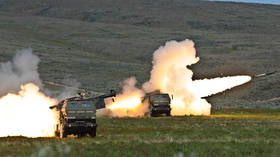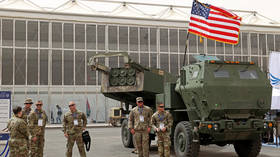Diversity of Western weapons creates trouble for Ukraine – media

The wide variety of weapons systems supplied to Ukraine by the West is proving a “serious challenge” for Kiev, the Wall Street Journal reported on Tuesday, citing US and UK think tanks. While insisting that the weapons are “effective” in the fight against Russia, analysts say the piecemeal delivery of multiple different systems has created a “logistical nightmare” for Kiev.
Early on in the conflict, the US and its allies sent Ukraine portable Stinger anti-aircraft missiles and Javelin anti-tank rockets, but quickly depleted their own stocks. In April, the White House announced the first delivery of heavy artillery – M777 towed howitzers – followed by HIMARS multiple rocket launch systems in June.
Kiev has so far received M777 guns from the US, Australia and Canada, but also a number of self-propelled systems such as the US M109, the German Panzerhaubitze (PzH) 2000, France’s Caesar and the Polish Krab, among others. While in theory they all share the same 155-caliber projectiles, things are not so simple in practice.
“None of these systems have that much commonality,” Jack Watling of the London-based Royal United Services Institute (RUSI) think tank told the Journal. “Ammunition should be interchangeable, etc. But that’s not the case.”
Watling co-authored the RUSI report published earlier this month, which argued that the “current approach by which each country donates a battery of guns in a piecemeal way is rapidly turning into a logistical nightmare for Ukrainian forces with each battery requiring a separate training, maintenance and logistics pipeline.” Some of it was based on input from Ukrainian military and intelligence officials.
The diverse artillery systems have different ranges, propellant charges, loading mechanisms, spare parts and maintenance requirements, among other things. One example cited was the PzH 2000, which has “specific requirements for loading charges” and takes 40 days of training Ukrainians in how to operate and maintain the dozen or so they’ve received so far.
Scott Boston, a senior defense analyst at the US-based RAND Corporation, pointed out other challenges in dealing with Western-made systems.
“A lot of the Ukrainian stuff is legacy – 40-year-old vehicles that you fix with a hammer and a wrench, brute force, lubricants and prayer. If you think about how a mechanic fixes a modern consumer automobile – with a hand-held computer that you hook up to read the sensors inside the vehicle – it is going to be different,” he told the Journal, adding that not having spare parts other than what comes in from the West is further complicating matters.
Ukraine is effectively suffering from too much diversity of weapons, and RUSI’s Watling has suggested the West should try to limit the number of different systems it’s sending to Kiev.
Russia sent troops into Ukraine on February 24, citing Kiev’s failure to implement the Minsk agreements, designed to give the regions of Donetsk and Lugansk special status within the Ukrainian state. The protocols, brokered by Germany and France, were first signed in 2014. Former Ukrainian president Pyotr Poroshenko has since admitted that Kiev’s main goal was to use the ceasefire to buy time and “create powerful armed forces.”
In February 2022, the Kremlin recognized the Donbass republics as independent states and demanded that Ukraine officially declare itself a neutral country that will never join any Western military bloc. Kiev insists the Russian offensive was completely unprovoked.













